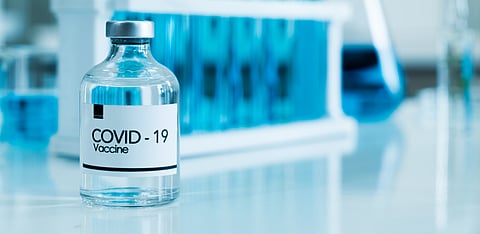

Efforts of developing countries to break the patent monopoly on COVID-19 vaccines, therapeutics and diagnostics have received a jolt with the leak of a compromised draft text on the waiver of World Trade Organisation (WTO) intellectual property rights, further exposing the sinister designs of the Global North and Big Pharma to perpetuate profits at the cost of lives.
The "compromise outcome", which is significantly different from the original TRIPS (Agreement on Trade-Related Aspects of Intellectual Property) waiver proposed in October 2020, purportedly emerged from the recent informal discussions among the US trade representative (USTR), the European Union (EU), South Africa and India led by the WTO Secretariat.
On March 15, the draft text, 'TRIPS COVID-19 Solution—the outcome of the quadrilateral discussions, to be presented to WTO Members', was circulated.
Numerous voices across the globe—civil society, academics, researchers and experts—have spoken against the leaked draft text on the waiver proposal. Leading public health organisations such as the People's Vaccine Alliance, Médecins Sans Frontières, Third World Network, People's Health Movement, Oxfam International and several academics have criticised it on numerous grounds and called for its rejection.
In October 2020, as the pandemic wreaked havoc across the globe, India and South Africa had tabled the TRIPS waiver proposal for COVID-19 health technologies, including diagnostics, therapeutics and vaccines. The proposal, mooted earlier, had demanded waiver from the obligation on copyrights and related rights, industrial designs, patents, and the protection of undisclosed information in relation to the prevention, containment, or treatment of COVID-19.
Such a waiver would provide countries with the policy space to collaborate in research and development and manufacturing, scaling up and supplying COVID-19 tools, including drugs, vaccines, diagnostics, and other technologies, such as masks and ventilators. More than 100 developing countries supported the proposal, which is still under negotiation at the WTO as most developed countries have opposed it and thus protected the interests of Big Pharma.
However, the pressure of rich countries and the intense lobbying by Big Pharma have ensured a stalemate over the proposal even after about 17 months.
"The difficult and protracted process has resulted in a compromise outcome that offers the most promising path towards achieving a concrete and meaningful outcome," Adam Hodge, assistant USTR for media and public affairs, wrote about the leaked draft text.
However, the Left in the European Parliament came out strongly against the leaked draft text of the "compromise outcome" regarding the TRIPS waiver proposal. Calling the leaked text a win for pharmaceutical companies and their lobbying for intellectual property protections, the Left in the European Parliament noted that it "… does not waive patents, and it does nothing to facilitate the transfer of vaccine-making recipes and other technical know-how that enable vaccine production to countries that need it most".
Criticising the EU for protecting the profits of its pharmaceutical industry as millions of people died, the group issued a statement: "What the EU presents as 'compromise' is actually a repackaging of old proposals with minor adaptations. The proposal has the potential to make things worse. It adds new restrictions and requirements that currently don't exist and will undermine existing flexibilities."
There have also been appeals by South African academics and a letter written by economists Jayati Ghosh, Joseph Stiglitz along with Oxfam's Peter Kamalingin urging the South African President Cyril Ramaphosa to not accept the "compromise" text. Commending his unwavering leadership with regard to the TRIPS waiver proposal, they unequivocally lambasted the leaked draft text.
Ghosh, Stiglitz and Kamalingin pointed out that "this text reflects the interests of multinational pharmaceutical companies in preserving the deadly status quo".
In particular, the leaked text has been criticised by various experts on the following grounds:
South Africa and India have not commented on the leak so far. The Indian civil society and some of the Members of Parliament have also written to Prime Minister Narendra Modi to reject the leaked text.
The pandemic has seen sharp vaccine inequality across the globe. While rich countries have been able to vaccinate most of their population, poor countries have been facing the brunt. There is stark inequality persisting in vaccination across the rich and the poor countries.
Figure 1 shows that the booster doses (given after completion of tow-dose vaccination) in high-income countries exceed the mandatory two-dose vaccination in poor countries.
A detailed look reveals that more than 80% of the population in low-income countries has not been vaccinated. Most of them have not been vaccinated because of the limited vaccine supply. On the other hand, more than 40% of the population in high-income countries has got three doses. Most of the big vaccine manufacturers have failed the poor countries throughout the pandemic.
It is only a useful and meaningful outcome on the TRIPS waiver proposal that "holds the key to promoting equitable access to the COVID-19 medical tools that can facilitate and sustain socio-economic recovery and protect the lives and livelihoods in South Africa, India and many other developing countries", Ghosh, Stiglitz and Kamalingin noted.
First published by Newsclick.